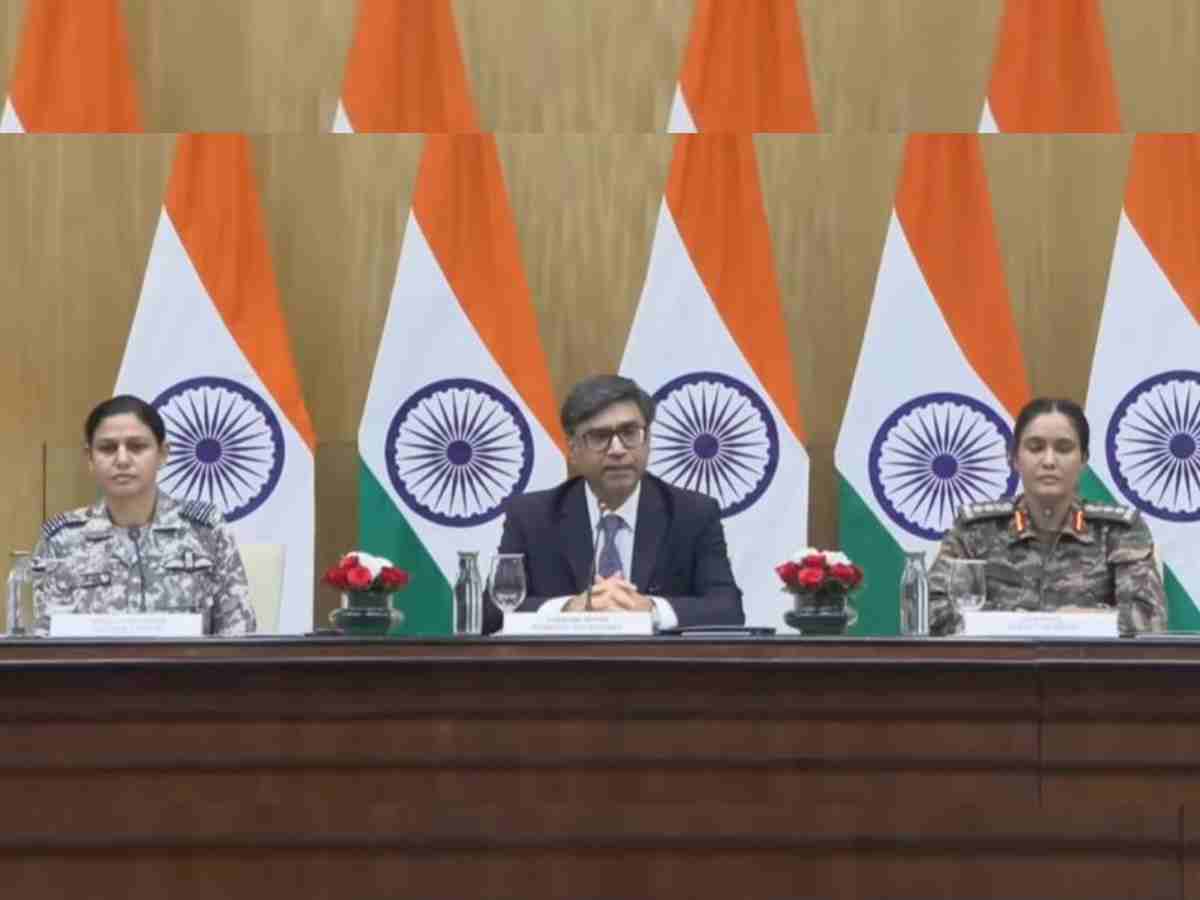India on Saturday accused Pakistan of launching a series of provocative and escalatory military actions over the past few days, including drone incursions, missile strikes, and shelling targeting both military and civilian infrastructure across the country’s western sector.
Addressing a press briefing in New Delhi, Foreign Secretary Vikram Misri said, “Earlier this morning, we saw a repeat of this escalatory and provocative pattern,” adding that India has always responded “in a responsible and measured fashion” to provocations from Pakistan.
He was joined by Colonel Sofiya Qureshi and Wing Commander Vyomika Singh, who gave further details of Pakistan’s alleged cross-border operations and India’s response.
“The Pakistani army is continuously attacking the western borders; it has used drones, long-range weapons, loitering munitions, and fighter jets to attack India’s military sites,” said Col Qureshi. She added that Pakistan attempted to infiltrate Indian airspace at more than 26 locations. Key targets included air bases in Udhampur, Bhuj, Pathankot, and Bathinda, which suffered damage to equipment and personnel.
“At 1.40 a.m., they used high-speed missiles to target Punjab’s air base. They even attacked health facilities and schools,” she said, calling the strikes a deliberate attempt to destabilise civil life.
Col Qureshi said Pakistan’s air incursion into Punjab was part of a broader attack strategy, which included shelling along the LoC and targeting hospitals and schools at air bases in Srinagar, Awantipur, and Udhampur. “This once again revealed their irresponsible tendency of attacking civil infrastructure,” she added.
Following these attacks, the Indian armed forces undertook a calibrated and effective retaliatory operation. “After Pakistan deliberately targetted air bases, Indian armed forces took quick and well-planned retaliatory action and targeted technical installations, command and control centres, radar sites, and arms stores,” Col Qureshi said. “Pakistan military bases at Rafiqui, Murid, Chaklala, Rahim Yar Khan, Sukkur, and Chunianwere targetted through air launch, precision ammunition, and fighter jets. A radar site in Pasrur and an aviation base in Sialkot were also targetted with precision ammunition. During these actions, India ensured minimum collateral damage and losses.”
To counter Pakistan’s disinformation efforts, Wing Commander Vyomika Singh presented time-stamped images showing Indian air bases remained intact.
“In a swift and calibrated response, Indian armed forces carried out a precision strike only at identified military targets,” Singh said. “Pakistan has also attempted to execute a continued malicious misinformation campaign, with claims of destruction of the Indian S-400 system, destruction of airfields at Suratgarh and Sirsa… India unequivocally rejects these false claims being spread by Pakistan.”
She also confirmed increased mobilisation of Pakistani troops towards forward areas. “This indicates an offensive intent to further escalation. Indian armed forces remain in a high state of operational readiness, and all hostile actions have been effectively countered and responded to proportionately,” she said.
Foreign Secretary Misri further reported that Pakistan shelled the town of Rajouri, killing the Additional District Development Commissioner Raj Kumar Thapa and adding to civilian casualties.
He also addressed Islamabad’s claim that India had targeted Afghanistan. “There is this yet again completely ludicrous claim that Indian mailers have hit Afghanistan—totally frivolous allegation—and I only want to point out that Afghan people don’t need to be reminded about which country it is that has, on multiple occasions in just the last one and a half years, targeted civilian populations and civilian infrastructure in Afghanistan,” he said.
Misri also criticised comments from Pakistan’s military spokesperson. “We have also seen in some of the remarks that the Pakistani army spokesman seems to take great joy at the fact that the Indian public should criticise the Government of India with various issues. It may be a surprise to Pakistanis to see the citizens criticising their own government, as that is a hallmark of open and functional democracy. Pakistan’s unfamiliarity with that shouldn’t be surprising.”
In the wake of the April 22 Pahalgam terror attack, India has reiterated that while it remains committed to non-escalation, it reserves the right to defend its territory and civilian population from further provocations.





